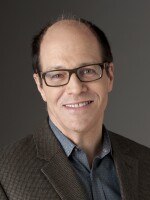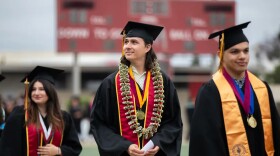STEVE INSKEEP, host:
For the first time ever, a woman has won the Nobel Prize for Economics. She is American Elinor Ostrom of Indiana University. She will share the prize with Oliver Williamson of the University of California at Berkeley who is also American.
NPR's Jim Zarroli has been covering this story and joins us now. Jim, good morning.
JIM ZARROLI: Good morning, Steve.
INSKEEP: What did these two do?
ZARROLI: Well, this was something of a surprise. I mean, as always, there was a lot of speculation ahead of time about who might win. Neither of these two was mentioned, although they are very prominent in their fields. They have a lot of academic honors, very well-known and respected.
Basically, they said that the Swedish Academy said they had been instrumental in bringing something called economic governance research from the fringe to the forefront of scientific attention. In other words, how do organizations -and in particular those outside the market - how do they affect economic decisions?
INSKEEP: What do you mean by people outside the market?
ZARROLI: Well, let's take the case of Elinor Ostrom. She has said that she grew up there in World War II. Her mother had a victory garden in Los Angeles where they lived and it taught her how people, you know, when they're presented with a resource problem, can learn to cooperate, can learn to act for the common good. Her dissertation was on managing water supplies in Southern California.
Ostrom looks at the ways that organizations can work together to try to keep resources viable. And that means, you know, something like a police department, something manmade, ran by men, it would also mean something natural like a forest or water supply. How did these institutions generate the information that people need to make decisions and, you know, what kind of biases do they bring to the table?
INSKEEP: Well, now that's really interesting, Jim, because here we are in this situation where people have been looking at the nature of the free market and the short-time drive for profits. And you're talking about people here or an economic exploration of people here who maybe still are interested in profits but they're thinking in broader terms in terms of almost an enlightened self-interest.
ZARROLI: Exactly. And one of the things that the Swedish Academy said was that Ostrom had challenged the conventional wisdom that common property is poorly managed and that it either has to be regulated by central authorities or privatized, which is the - that's the debate we have all the time now.
In other words, she says and her research said, if you look at the way individuals have worked together to do something like manage a fishery or a pasture or ground water supplies, the results tend to be a lot better than you would expect.
INSKEEP: Well, I suppose we should be grateful, Jim Zarroli, that after the financial disasters of the past year, the Nobel Committee are still willing to consider the possibility that any American knows anything about economics. And we actually have two Americans here, the other one Oliver Williamson.
ZARROLI: Right. He was cited for his studies of economic governance. He's the author of a classic textbook called "Economic Institution of Capitalism." He's known for studying something called transaction cost economics. He says organizations try to make decisions for rational reasons, that's classic economics. But rationality has its limits. People are limited by, you know, bad memory. They're limited by the computational skills, the way they gather and process information. And these are a kind of a dead weight on economic decisions. They limit the efficiency of organizations.
Williamson was cited for developing a theory about the way businesses try to resolve conflicts. He said they have their own ways of doing that. And, of course, as you noted, corporate governance is a very hot issue lately because of the economic crisis we're in also because of the corporate scandals that have taken place. These kinds of things are at the center of Williamson's research.
INSKEEP: Jim, thanks very much.
ZARROLI: You're welcome.
INSKEEP: That's NPR's Jim Zarroli on the news today that two Americans have won this year's Nobel Prize in Economics, Elinor Ostrom and Oliver Williamson.
This is NPR News. Transcript provided by NPR, Copyright NPR.






